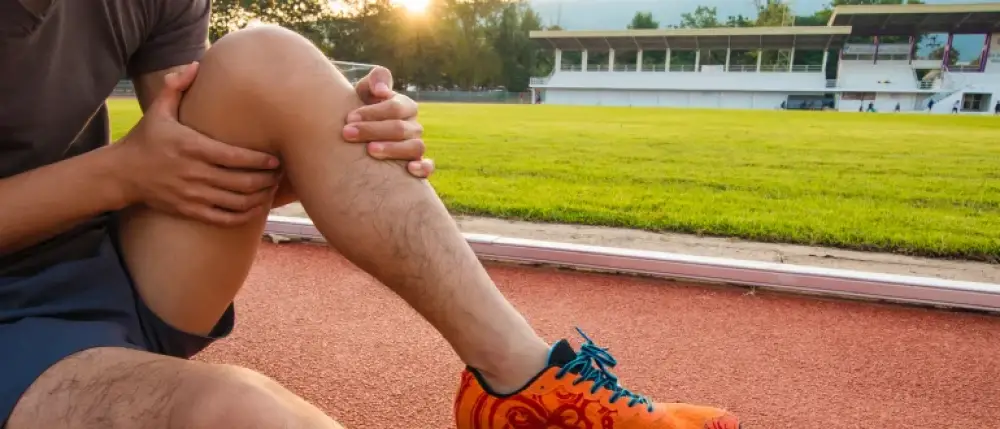Subscribe to get weekly insights
Always stay up to date with our newest articles sent direct to your inbox
Published on 16 Oct, 2023
Updated on 17 Oct, 2023
5059 Views
5 min Read

Written by Care Health Insurance
favorite0Like
favoriteBe the First to Like
The knees are the largest joint in the human body and a part of the skeletal system. It is the joint that connects your upper leg to the lower leg and also contains ligaments, nerves, cartilage, and muscles. Without functional knees, it is nearly impossible to make movements like walking, running, cycling, or anything that requires you to fold or bend your knees. It also helps you keep your body stable when in a standing position.
However, sometimes, your knees may not respond well, and it may be hurtful to move your knees. This condition is common in young adults as well. There can be several knee pain causes, and your doctor may be able to advise you on the best solution.
In this article, we will talk about the causes of knee pain in young age and how it may affect your body movements. Read on to know more.
Knee pain is commonly associated with old age. However, it can also occur in young adults and teens. There are several knee pain causes in young adults, and treating the problem immediately is the best solution. Leaving knee pain unchecked can only worsen the situation if there is a serious problem. So, if the problem continues for a few days in your teens, you must visit a doctor as soon as possible.
If you are wondering, "why do my knee hurt?" Here are some of the possible causes of knee pain in a young age:
In order to understand how to get rid of knee pain fast, you must also understand the symptoms of knee pain. Depending on the cause of the knee pain, the symptoms may vary. Some of the common symptoms include:
Since knees are essential to keep your body aligned, severe knee problems and pain may cause body balancing problems. You may not be able to walk, stand or bend your knees comfortably in such a condition.
>> Also Read: 5 Freehand exercises for your Daily Workout
Knee pain can cause discomfort in day-to-day activities. So, if your knee problem persists for a few days, it is best to visit a doctor and get the problem diagnosed. Here is how knee pain and problems are diagnosed:
Once the problem has been diagnosed, your doctor will suggest you a remedy for the same.
Knee pain can be relieved at home. Usually, in teens, home remedies for knee pain can show improvement and even cure the problem if there is no serious problem. However, we highly recommend that before any kind of home treatment, you must consult your doctor, especially if your pain is severe and has been consistent.
As mentioned above, home remedies come in handy only in case the pain is not severe. However, in case of acute pain, you must see a doctor and follow the below:
If you are wondering what is the fastest way to relieve knee pain, medicines can be the answer. Your doctor may suggest painkillers and other anti-inflammatory drugs to keep the pain under control. Make sure to take pills only after a consultation.
Once you have gone through the diagnosis, you may ask your doctor if you can go for a knee massage. It might help to get the situation better and relief the pain.
In some cases, you may be advised to perform certain exercises on a daily basis for a few days to help the knee condition. Additionally, physiotherapy may also be recommended
In serious cases of fracture, severe ligament trauma, etc., knee surgery may be needed.
Knee pain may be a possibility for people with heavy weight. Since the upper body weight is more, it may put extra pressure on the knees. Apart from this, people with weak muscles and poor body balance may also be prone to knee problems. So, make sure to eat healthy, perform daily exercise, and maintain a healthy weight.
In case of persistent pain, do not delay medical attention. Walking, climbing stairs, and even standing can be affected due to severe knee pain. Home remedies for knee pain while climbing stairs or for other activities may be helpful to a great extent, but only in case of non-serious conditions.
In some cases, knee surgery may be advised in order to make the knees functional again. The cost of surgery may be high. Buying health insurance early in life can be quite helpful. With Care Health Insurance, you can purchase a plan as per your preferences. Under Care Super Mediclaim you can get coverage for defined surgical procedures and be assured of financial aid in times of medical emergencies. For more information allow our experts to get in touch with you.
We wish you good health!
Disclaimers: The above information is for reference purposes only: Policy Assurance and Claims at the underwriter's discretion.
favoriteBe the First to Like
शुगर कंट्रोल कैसे करे? जानें, डायबिटीज में क्या खाना चाहिए Care Health Insurance in Health & Wellness
Thyroid : मामूली नहीं हैं महिलाओं में थायराइड होना, जानें इसके लक्षण और घरेलू उपचार Care Health Insurance in Diseases
हाई ब्लड प्रेशर को तुरंत कंट्रोल कैसे करें? देखें इसके उपाय Care Health Insurance in Diseases
प्लेटलेट्स की कमी के लक्षण, कारण और इलाज क्या है Care Health Insurance in Diseases
Dehydration: What Your Body's Trying to Tell You Care Health Insurance in Health & Wellness
Breaking Down Neurosis vs Psychosis—Meaning, Differences, & More Care Health Insurance in Mental Health
Is Black Pepper Good for You? 11 Health Benefits of Fiery Spice! Care Health Insurance in Diet & Nutrition
What is IBS? Signs, Triggers & Solutions that Work Care Health Insurance in Diseases